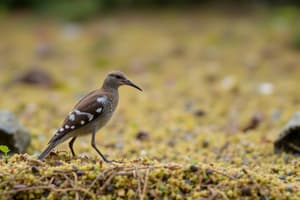Podcast
Questions and Answers
What does biodiversity conservation primarily aim to protect?
What does biodiversity conservation primarily aim to protect?
- Only ecosystems with aesthetic value
- Only endangered species
- Ecosystems, species, and genetic diversity (correct)
- Human economic interests
Which of the following is NOT considered a regulating service of ecosystems?
Which of the following is NOT considered a regulating service of ecosystems?
- Climate regulation
- Food security (correct)
- Nutrient cycling
- Air and water purification
How does biodiversity enhance environmental resilience?
How does biodiversity enhance environmental resilience?
- By creating more complex ecological interactions (correct)
- By increasing human dependency on single species
- By decreasing habitat diversity
- By concentrating species in smaller areas
What is a key strategy in biodiversity conservation?
What is a key strategy in biodiversity conservation?
Which type of ecosystem service includes air and water purification?
Which type of ecosystem service includes air and water purification?
What is the primary goal of climate change adaptation?
What is the primary goal of climate change adaptation?
Which service is categorized under supporting services of ecosystems?
Which service is categorized under supporting services of ecosystems?
Which of the following best describes sustainable land-use planning?
Which of the following best describes sustainable land-use planning?
Flashcards are hidden until you start studying
Study Notes
Environmental Resilience
Biodiversity Conservation
- Definition: The preservation and protection of ecosystems, species, and genes to maintain ecological health and function.
- Importance:
- Maintains ecosystem services (e.g., air and water purification, soil formation)
- Supports human well-being (e.g., food security, medicine, recreation)
- Enhances environmental resilience to disturbances
- Strategies:
- Habitat preservation and restoration
- Species conservation (e.g., endangered species protection)
- Sustainable land-use planning
- Reducing human impact (e.g., pollution, overfishing)
Ecosystem Services
- Definition: The benefits humans derive from functioning ecosystems, including:
- Provisioning services (e.g., food, water, timber)
- Regulating services (e.g., climate regulation, air and water purification)
- Cultural services (e.g., recreation, tourism, spiritual values)
- Supporting services (e.g., soil formation, nutrient cycling)
- Types of ecosystem services:
- Supporting services: Underpin all life on Earth, including soil formation, nutrient cycling, and primary production.
- Provisioning services: Provide goods, such as food, fresh water, and timber.
- Regulating services: Regulate the environment, including climate, air and water quality, and natural disasters.
- Cultural services: Provide non-material benefits, such as recreation, tourism, and spiritual values.
- Importance: Essential for human well-being, economic development, and environmental sustainability.
Climate Change Adaptation
- Definition: The process of adjusting to the current and future impacts of climate change to minimize its effects.
- Importance:
- Reduces vulnerability to climate-related hazards
- Enhances environmental resilience
- Supports human well-being and economic development
- Strategies:
- Adaptation planning: Identifying climate risks and developing responses
- Ecosystem-based adaptation: Using natural ecosystems to provide climate resilience
- Infrastructure development: Designing and building climate-resilient infrastructure
- Climate-smart agriculture: Implementing practices that enhance agricultural resilience to climate change
Environmental Resilience
Biodiversity Conservation
- Preserves ecosystems, species, and genes to maintain ecological health and function
- Maintains ecosystem services, supporting human well-being and environmental resilience
- Importance:
- Supports food security, medicine, and recreation
- Enhances environmental resilience to disturbances
- Maintains ecological health and function
- Strategies:
- Preserves and restores habitats
- Conserves species (e.g., endangered species protection)
- practices sustainable land-use planning
- Reduces human impact (e.g., pollution, overfishing)
Ecosystem Services
- Defines benefits humans derive from functioning ecosystems
- Includes:
- Provisioning services (e.g., food, water, timber)
- Regulating services (e.g., climate regulation, air and water purification)
- Cultural services (e.g., recreation, tourism, spiritual values)
- Supporting services (e.g., soil formation, nutrient cycling)
- Types:
- Supporting services underpin life on Earth
- Provisioning services provide goods
- Regulating services regulate the environment
- Cultural services provide non-material benefits
- Importance:
- Essential for human well-being, economic development, and environmental sustainability
Climate Change Adaptation
- Defines adjusting to climate change impacts to minimize effects
- Importance:
- Reduces vulnerability to climate-related hazards
- Enhances environmental resilience
- Supports human well-being and economic development
- Strategies:
- Plans for climate risks and develops responses
- Uses natural ecosystems for climate resilience
- Develops climate-resilient infrastructure
- Implements climate-smart agricultural practices
Studying That Suits You
Use AI to generate personalized quizzes and flashcards to suit your learning preferences.




